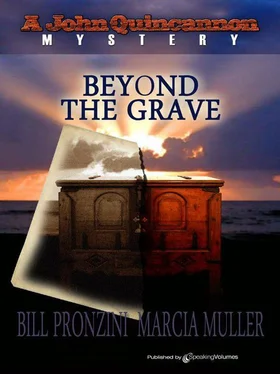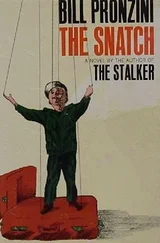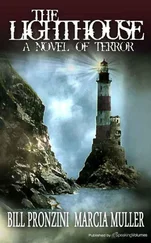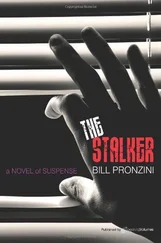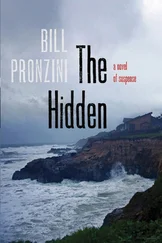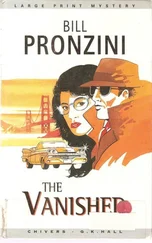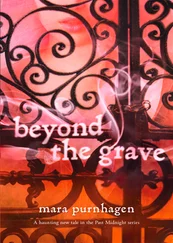Bill Pronzini - Beyond the Grave
Здесь есть возможность читать онлайн «Bill Pronzini - Beyond the Grave» весь текст электронной книги совершенно бесплатно (целиком полную версию без сокращений). В некоторых случаях можно слушать аудио, скачать через торрент в формате fb2 и присутствует краткое содержание. Год выпуска: 2011, ISBN: 2011, Издательство: Speaking volumes, Жанр: Исторический детектив, на английском языке. Описание произведения, (предисловие) а так же отзывы посетителей доступны на портале библиотеки ЛибКат.
- Название:Beyond the Grave
- Автор:
- Издательство:Speaking volumes
- Жанр:
- Год:2011
- ISBN:9781612321202
- Рейтинг книги:4 / 5. Голосов: 1
-
Избранное:Добавить в избранное
- Отзывы:
-
Ваша оценка:
- 80
- 1
- 2
- 3
- 4
- 5
Beyond the Grave: краткое содержание, описание и аннотация
Предлагаем к чтению аннотацию, описание, краткое содержание или предисловие (зависит от того, что написал сам автор книги «Beyond the Grave»). Если вы не нашли необходимую информацию о книге — напишите в комментариях, мы постараемся отыскать её.
Beyond the Grave — читать онлайн бесплатно полную книгу (весь текст) целиком
Ниже представлен текст книги, разбитый по страницам. Система сохранения места последней прочитанной страницы, позволяет с удобством читать онлайн бесплатно книгу «Beyond the Grave», без необходимости каждый раз заново искать на чём Вы остановились. Поставьте закладку, и сможете в любой момент перейти на страницу, на которой закончили чтение.
Интервал:
Закладка:
I followed 101 as it looped around the business district, then got off on Milpas Street and drove up into the hills, following Foothill Road and looking at the nice houses. I thought about my own house and how I really should call some painters. I wondered if I would ever be able to afford to move away from the old neighborhood, buy something higher up with a view; then I wondered if I even wanted to do that. If I had more money, I'd probably just remodel the kitchen and bathroom, maybe build a deck….
Of course I wasn't fooling myself. I hadn't really come up here to lust after the real estate. A mile or so ahead. Foothill intersected with San Marcos Pass Road. And that route would lead to Las Lomas.
I don't normally like to just drop in on people, and I hate for friends to drop in on me. But I sensed Sam Ryder was the type of person who would welcome a surprise visit. Besides, I didn't intend to stay long; I just wanted to ask him a few questions, one of which was where Arturo Melendez lived. Then I'd stop at Arturo's and ask him if he'd like to make the promised pilgrimage to the ruins of Rancho Rinconada de los Robles. While we were there we could discuss a possible showing of his paintings at the museum.
When I arrived, the village once again looked deserted, but its small dwellings and unkempt square seemed more pleasant to me today, as any place will once you know good people who live there. I parked in front of Sam's house and followed the path through the weeds to the porch. Apparently he had heard the car because he came to the door before I knocked.
I started to apologize for not calling first, but he waved the words away and asked if I'd brought Quincannon's report. I gave him the papers I'd found at Mrs. Manuela's and explained about the others being locked up at the museum, where I'd promised myself I wouldn't go today. Sam didn't seem to care that the report wasn't complete; he took the papers in his hands eagerly and motioned for me to come in.
The desk under the front window was messier than it had been on Sunday, and there were file cards strewn all over the floor. Sam had a big smudge of black ink on his chin, and there was a pencil stuck into the tuft of curly red hair above his right ear. He looked up from the report, wrinkled his nose at the room, and took me into the kitchen.
“It's not going well today?” I asked.
“No. I just don't care what the Russians and French did to the Oregonians. Ever since you were here on Sunday I've been haunted by visions of Don Esteban Velasquez and his artifacts.” He patted the report and set it down on the chopping block with obvious reluctance.
I said, “Me, too. That's why I'm here. I need some professional advice.”
He motioned toward the director's chair I'd occupied on my previous visit. “Glad to help. You want a beer?”
“If you're having one. But I don't want to keep you from your work.”
He got out two Budweisers and held up a glass, looking at me questioningly. When I shook my head, he popped the tabs on both cans and handed me one. “The work will keep. It's fourteen to zip in favor of the Russo-French team, and frankly I'm bored with the game.” He sat down in the other chair, propping his feet against the chopping block, and added, “Thanks for not insisting on elegance. I hate to wash glasses.”
I said, “I should have stayed to help you with the dishes the other night.”
“That's okay. I can always count on Arturo for the washing up.”
“Speaking of him, one of the things I wanted to ask you is where he lives.”
“Diagonally across the square, three doors down from Dora. It's the little log cabin with moss growing all over the roof.”
The idea of one of my people living in a log cabin struck me as amusing, and I smiled.
Sam raised an eyebrow.
“Ethnic incongruity,” I said.
“Yeah, I know what you mean-he'd look funny in a coonskin cap. What else did you want to see me about? This report?” He motioned at the chopping block.
I summarized what was in the report for him and told him that I hoped there might be more pages in existence. “Is there anyplace that you know of where the files of that detective agency might have ended up?” I asked. “Or is there any organization that could tell me what happened to Carpenter and Quincannon?”
Sam ran a hand over his chin, smudging the ink streak even more, and finally said, “This was a San Francisco agency, right?”
“Yes.”
“Offhand, I can think of three places you could try: the California Historical Society branch in San Francisco, the California History Room of the public library there, and the Bancroft Library in Berkeley. But I'd say you're more likely to find the files of a defunct San Francisco business at one of the first two. I know the librarians at both; if you use my name and identify yourself as director of your museum, they'll be more than willing to help you.”
He got the names and numbers and told me to use the phone on his desk. I cleared off a space where I could set my notepad in case I needed to write anything down and then called the California History Room at the public library, billing the charges to my home number. As Sam had said, the librarian was very cooperative and took down what information I had; she said she'd call back within the hour. Next I tried the Historical Society; they had a computerized filing system, and after only a few minutes, their librarian told me there was no information on Carpenter and Quincannon, Professional Detective Services.
I decided to wait for the reply from the public library before investing in a call to Berkeley, and Sam and I spent the time drinking another beer and speculating on John Quincannon: what he had been like, how long he had lived, whether he had ever found the Velasquez artifacts. When the phone finally rang, it was my call from San Francisco. The librarian told me she had been able to locate the materials I'd requested. There was a great deal of material from the files of Carpenter and Quincannon, including rough notes for the specific report I was looking for.
What other kinds of materials were there? I asked her. Was there anything of a personal nature, about the detectives themselves?
There were some diaries and private correspondence, she replied, and there might be a photograph or two. Of course I'd be welcome to look at anything they had. Did I plan to come to San Francisco to study the documents?
I hesitated. The trip would take a couple of days, and I didn't feel right about leaving town while Mama was in the hospital-especially since I would have to spend time cosseting her in order to make up for my earlier harsh words. “Is it possible for you to copy the documents and send them to me?” I finally asked.
Now the librarian hesitated. “This is for the Santa Barbara Museum of Mexican Arts?”
“Yes. I'm director there.”
Apparently she didn't see anything odd in an art museum requesting that type of historical information, because she said, “Normally we only perform such services for cardholders, and we'd need prepayment, but I think we can make an exception in your case-especially since you were referred by Sam Ryder.”
“Thank you. I really appreciate it.” Then, even though it was overstepping the bounds of courtesy, I added, “Do you think you could send them Express Mail?”
Again she didn't balk at my request, but merely agreed, saying I'd have the copies tomorrow morning and that an invoice would be enclosed.
I went back to the kitchen and flopped down in the director's chair, toasting Sam with my beer bottle. “Success. She'll put copies of the reports in the mail tonight, express.”
“That means that by tomorrow we'll know the end of the saga. Will you bring the papers up here-all of them, including the first ones you found?”
Читать дальшеИнтервал:
Закладка:
Похожие книги на «Beyond the Grave»
Представляем Вашему вниманию похожие книги на «Beyond the Grave» списком для выбора. Мы отобрали схожую по названию и смыслу литературу в надежде предоставить читателям больше вариантов отыскать новые, интересные, ещё непрочитанные произведения.
Обсуждение, отзывы о книге «Beyond the Grave» и просто собственные мнения читателей. Оставьте ваши комментарии, напишите, что Вы думаете о произведении, его смысле или главных героях. Укажите что конкретно понравилось, а что нет, и почему Вы так считаете.
